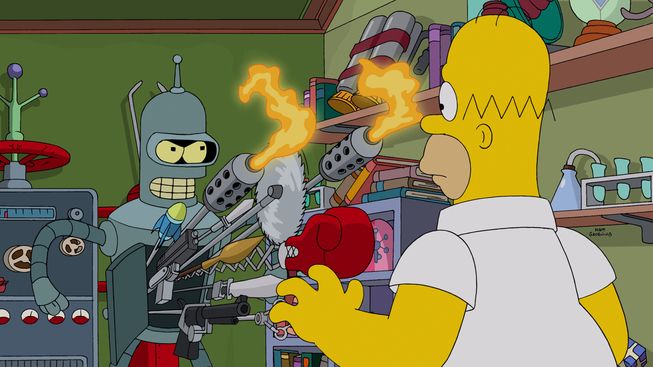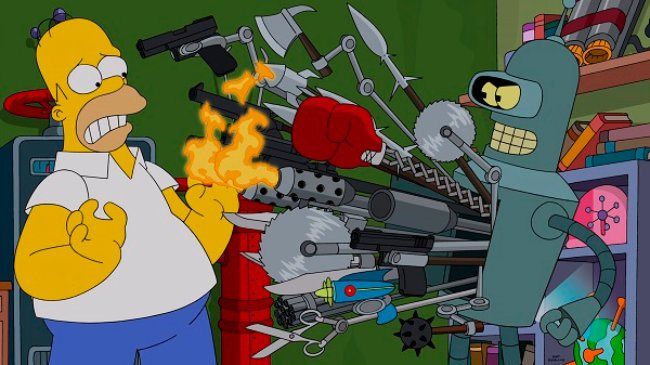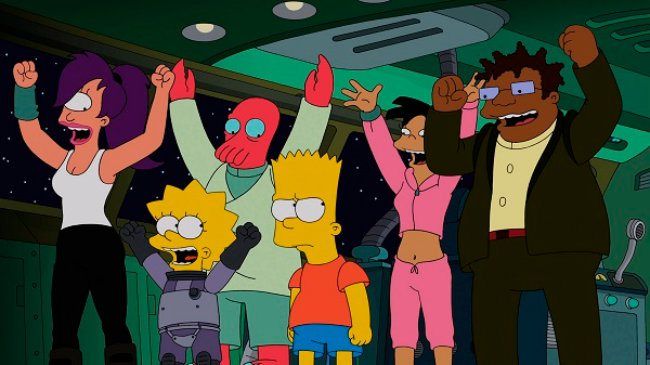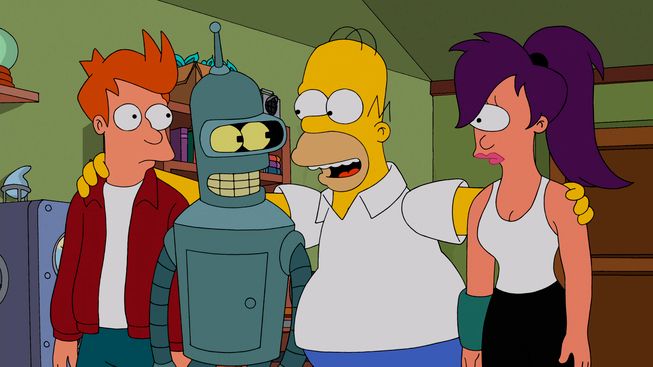Not even cancellation can keep the Planet Express crew down, as Futurama demonstrates Sunday when it lands in Springfield for the eagerly anticipated episode of The Simpsons titled “Simpsorama.”
But before that, however, Yeardley Smith, who’s given voice to Lisa Simpson for nearly three decades, and John DiMaggio, who’s provided the dulcet tones of the beer-swilling robot Bender since 1999, participated in a conference call with reporters to discuss the crossover.
According to Fox, the Planet Express crew travels back in time to present-day Springfield to prevent the titular yellow-skinned family from destroying the future. However, Smith has a decidedly different perspective on the plot. "I’m like, ‘That’s not what the episode’s about!”' she exclaims. "We’re trying to keep Bender from killing Homer. So there. I won’t tell you how that ends, but that’s a totally different story.”
On their favorite Simpsons/Futurama character interactions:
John DiMaggio: I enjoyed the exchanges between Bender and Homer. And Bender and Lisa – and Leela and Marge, actually.
Yeardley Smith: I totally agree. That’s what I was going to say, too. There’s some great stuff … Lisa's convinced Bender is perhaps not the most advanced robot in the history of the world. How is this possible? But Bender and Lisa have some great, great exchanges. Bender – even though Bender’s not necessarily technologically advanced, he’s sort of that take-no-prisoners kind of guy, and Lisa always responds to that.
DiMaggio: Also, I really think Lisa is the coolest Simpson in the future. That’s my vote. I really believe that. She’s the one that’s fully ready to handle being in the year 3000.
Smith: This is true. She’s the one who’s going to get away and survive, to make sure that the entire human race doesn’t come to an end.
On how both Matt Groening-created shows blend seamlessly in style and sensibility:
Smith: Certainly one of the similarities for me, when I was watching it, Is the animation dovetails quite beautifully. But when we did the Family Guy/Simpsons episode, you can totally see the difference in animation style, which works, but this you go, "Oh, oh, it’s sort of the same universe, if not the same planet." You know what I mean? There’s a common sensibility in the, I think in the dryness of humor.
DiMaggio: Yes, I would say the slow burns are very, very similar and, just the same, the character design is very, very similar. You’ll see a joke that points that out in the episode.
Smith: I have to say, you have to hand it to us for take no prisoners; we poke fun at everybody, including ourselves. I do like that about us.
DiMaggio: Yes, I think that the shows share that; their absolute ability to make fun of themselves. It’s quite crystal clear in this episode.
On recording with the casts of both shows assembled:
Smith: It was mayhem. It was complete mayhem. They had to batten down the hatches. They had to lock off the lot.
DiMaggio: It was pretty darn funny. There was a lot of buffoonery going on. It was great. It had a lot of laughs.
Smith: We do a table reading of the script before we record the episode a few days later and that was a really lively table read. Totally. That was just fun.
DiMaggio: That was really great. That was one for the ages.
Smith: Tress [McNeille] has done both shows [but otherwise] we had never worked together. They try to keep us apart because they know it’s probably a little oil and water and they don’t want to start a fight. Sometimes you just got to throw down like the two sides of the magnet together and see what happens.
DiMaggio: It’s kind of like a Crips/Bloods relationship, but it’s OK. We’ll get over it.
On being recognized for their famous voices:
Smith: I get recognized every day, mainly because I’ve done a lot of on-camera stuff, but I’ve looked the same since I was about the age of 6, and I sound the same. You can’t get away from me. Also I’ve been fortunate to do a lot of press for our show. You’d be surprised, actually, how much, how often I get made. People send me a lot of free food in restaurants, that’s all I can tell you.
DiMaggio: That’s pretty awesome. I get drinks bought for me, which is kind of detrimental to my health, but that’s OK.
Smith: At least you get to keep your girlish figure, John.
DiMaggio: Yes, specifically my breasts. No, but it’s funny: the more I’m around, the more I get noticed. I do a lot of conventions, as well; that puts my face out there and having to do press stuff like this, it definitely, definitely gets your face out there. Plus, I’ve also done on-camera stuff as well. It surprises me. It’s just that I’m a pretty big guy – I’m like 6 foot, 3 inches, 295. People are kind of nervous to approach me because they think I might eat them.
Smith: Meanwhile, people hug me in the supermarket. I don’t think that happens to you, John. They literally, like, “Oh, my God,” and then pull me toward them while I’m by the cabbages.
DiMaggio: Maybe you and I should shop together; they’ll stay away from both of us, you know.
On how their experience with each show stays fresh over the years:
DiMaggio: For me, it’s a cigar and a shot whiskey! I’m kidding. Yeardley was saying how smart the show is, the shows are, and it’s really true. I don’t have to worry about anything with a Futurama script. The writing staff for Futurama, specifically, is the most over-educated staff in Hollywood history.
Smith: We have the other half of the over-educated staff.
DiMaggio: Yes, exactly. We had all alumni from you guys. We have doctorates in chemistry and biology and math in the writing staff. There’s no reason for me to say, "Well, don’t you think this would be funnier?" There’s no real reason, I mean sometimes I’ll do something and it’ll be funny and it might stick, but when you have people that brilliant that work that hard on math jokes, you’re not just going, "Hey, what about the Pythagorean theorem?" That’s not going to work; that’s not going to cut it. For me, it’s always just relying on the brilliance of the writers and being able to bring it to life. I think the energy is the most important thing, for me – approaching it with the right energy and you go from there.
Smith: It’s not like doing Cats for 26 years where you’re doing the same lines and the same blocking. Oh, my God! I mean, seriously – you’d be homicidal! Every week, the words are completely different and I truly love Lisa Simpson and I have this funny relationship with her where I feel like she very much exists outside of me. I’m a part of her, but I’m really only a third of her. There’s the writing and the animating and then there’s me. We each take 33.3 percent and so it’s a very unique kind of collaboration, and when I watch Lisa Simpson on TV, she makes me laugh. Then I think, "Oh, oh – I’m a part of that!" And it’s tremendous.
On Smith's initial expectations for the role of Lisa Simpson:
Smith: As an actor who is actually very fortunate to have some success, you’re happy if a job lasts more than three weeks. I got The Simpsons because I’d done a tiny little play in Hollywood a year before The Simpsons was being cast, and the woman who cast The Simpsons on The Tracey Ullman Show was one of the 17 people who saw that play. She said, "I know you should play Lisa Simpson." It’s a great sort of Lana Turner drugstore story, don’t you think? But I will say, when my agent said you’re going to go in and read for this voiceover, I said, "I don’t want to do voiceover. This is not part of my plan for world domination; I don’t really care about that. It’s not on my list, but OK." He told me I should go, and I’m not an actress who turns down auditions so I’ll go.
I didn’t have a voiceover agent; I had never done voiceover before. I’ve really never done it since. When I got the job on The Tracey Ullman Show, and it was this strange format where I think we told a whole story in one minute, broken up into 20-second bumpers just before the commercial break. I was like, "This job is what? We’re doing what?" It was so unusual. I thought, "Look, I’m down with this as long as it doesn’t interrupt my true quest for world domination where I’m going to be a superstar."
Then we spun off into half-hour. I do remember everybody saying, "This is the worst idea a network has ever had. They haven’t had a cartoon on in primetime since The Flintstones. You all are high; you’re ridiculous – have a nice day." Then it hit so big. Of course, the turnaround was instantaneous: We’re like, "No, no, we knew it; we knew Simpsons were going to be big. It’s going to be awesome." Then you were happy that you went five years because now you can go into syndication and that’s the juggernaut. Then, it was 10 years, and then it was 15 years, and then you’re creeping up on Gunsmoke, which is 20 years. Then you pass Gunsmoke, and then you’re like, "OK, we now have writers on the show who grew up watching the show," and I don’t think there’s any other show on television that can say that. It’s been the best job of all time. I certainly landed in the honey pot, and thank God I was arrogant, but I wasn’t stupid. So here I am.
On whether Futurama still has a future:
DiMaggio: I think that there’s definitely the possibility of a future. Matt is always saying to us, “Hey, don’t worry about it – it’s all right.” You know, it's, "OK, when do we start? What’s going on?" We’re all pretty much game for doing more Futuramas, absolutely. One of the best experiences in my life, professionally, was doing Futurama. Anybody throws up the flag and says, "Here we go, we’re doing it,” I’m all game for it. There’s definitely more stories. The last episode ended the way it did and totally left the door open for more things to happen. You never know. Whether it comes back to network television or goes to something like Netflix or something like that – who’s to say? All I know is that the cast would be ready to do it at the drop of a hat.
On Smith's takeaway from the love-fest that spun out of FXX’s “Every Simpsons Ever” event:
Smith: I mean, it was astounding because it could have gone either way; it could have been, "You all shot your wad years ago, I don’t know why you’d think we want to watch every Simpsons ever," or it could have been the juggernaut that it was. That so was incredibly gratifying, when the risk you’re taking works out in your favor. I did check in. You know, it was really fun when people would tweet me about, "Oh, my God, this is my favorite line; my favorite episode; this is the best change." We’ve done so many episodes and I have a terrible memory anyway, so it’s sort of the perfect storm when people come up to you and go you remember the line, I’m like, "No I already don’t. I already don’t remember that so you probably know more about it than me."
It was wonderful to be able to then go back and see moments that people were loving and realize how truly, truly great they were. The show, for having been on the air for so long – they’ve really quite brilliantly developed it: In the beginning, The Simpsons never did anything that real people couldn’t do. For instance, we couldn’t drive an RV off the cliff and everybody survives because that doesn’t happen in real life. Then you got to like Season 9 and you’re like, "Oh, my God, what are we going to write about? You know what, maybe we should take advantage of the fact that we’re a cartoon; we’re going to drive that RV off the cliff and everybody’s going to survive and it’s going to be hilarious." They managed to milk every fantastic facet of the show and the genre to their best advantage and I continue to marvel at their ability to reinvent us in a way and keep us current and relevant. Things like putting Marge on the cover of Playboy and doing the FXX marathon and the games they come up with. This app that they launched in October – I mean, come on, that’s lightening in a bottle is what that is. I’m so grateful to be a part of something that smart.





